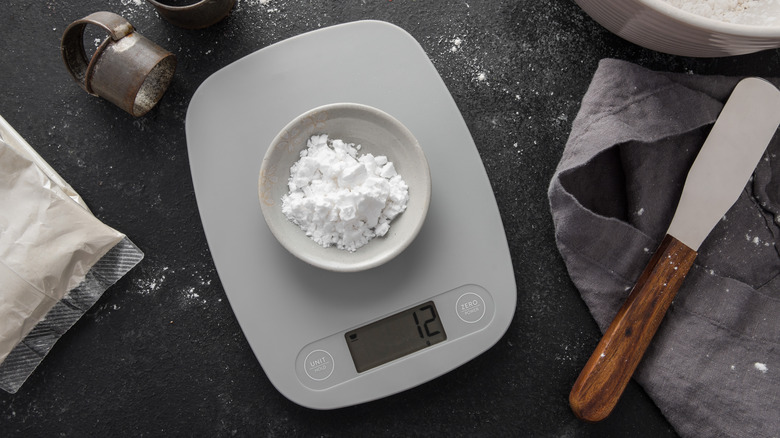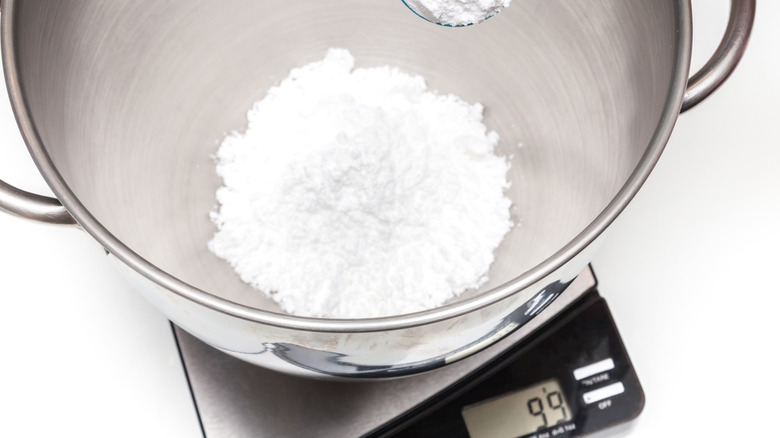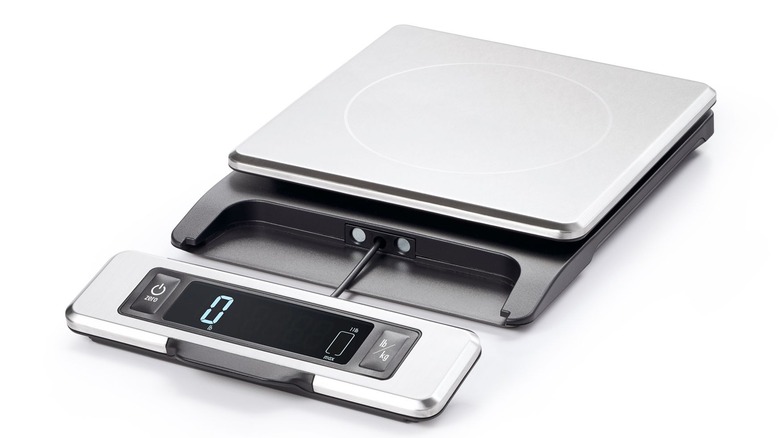Start Using A Scale For Baking And Thank Us Later
We may receive a commission on purchases made from links.
There's a common refrain with cooks that cooking is an art and baking is a science. For everyone who sees that as a truth, there are those that call it out as bunk. For the record, any type of cooking is a scientific endeavor, whether we know it. Frankly, many of us cook without caring about that question. That's fine, too.
But that divisive statement does hold water. The proportions of ingredients, how they're combined, and how they're cooked have a smaller margin for error in baking. Forget to add salt to a bread recipe and the results are massive. It'll raise too much, won't hold a shape, and it won't get a golden-brown crust. Of course, it won't taste great, either. Forget the salt in a batch of soup and you can always add some at the end. It isn't an ideal fix as there is a best time to season when cooking, but it doesn't mean you need to pour that soup down the drain. One salt mistake can be fixed; the other is a failure.
Kitchen scales are a must for baking
Something as simple and fundamental as measuring a cup of flour can vary dramatically from person to person. Volume measures are notoriously inconsistent for some items, like flour, which can be compressed to varying levels. It isn't such a big deal for other ingredients; but, even then, you're only going to be as accurate as your measuring cups. This is why, to perfect your bakes, you should stay away from novelty measuring cups.
Measuring by weight is much more accurate. No matter what, your cup of flour will be the same every single time. That will ensure you have consistent results. Good recipes include both the volumes and weights of ingredients. Even if they don't, you'll quickly start to remember the most common conversions. Start by printing off a weight chart, like this one from King Arthur Baking.
Accuracy is important, but the best part of using kitchen scales is efficiency. You can place a mixing bowl onto the scale, add an ingredient, zero out the digital scale, add the second ingredient, and so on. That's accurate; fast; and, best of all, results in very few dishes. For those of you washing dishes by hand, a kitchen scale might be the best dish-cleaning hack.
The best scales for baking
Kitchen scales aren't all created equal. First, don't bother with an old-fashioned analog version. Digital scales are more accurate, and zeroing out is as simple as pressing a button. They should toggle between metric and Imperial weights. Look for a smooth, easy-to-wipe-clean surface with minimal buttons; large, bright displays that use decimals versus fractions; and a broad scale surface to support larger measuring containers. If that platform can be removed for cleaning, all the better. Finally, a good kitchen scale needs to be able to weigh something up to at least 11 pounds (about 5 kilograms).
Digital kitchen scales with all those attributes don't have to be expensive. The kitchen equipment tests done at America's Test Kitchen revealed a great scale can be had for less than $10 from Amazon. The Ozeri Pronto Digital Multifunction Kitchen and Food Scale is available in a slew of colors and is perfectly accurate, durable, and easy to read.
Their ultimate kitchen scale, the OXO Good Grips 11-Pound Stainless Steel Food Scale with Pull-Out Display is worth every penny of its Amazon price of $55.99. It's easier to clean than the budget option because the measuring surface can be removed. Best of all, the digital screen can be pulled out from the base, allowing you to measure into huge containers without obscuring the readout.


